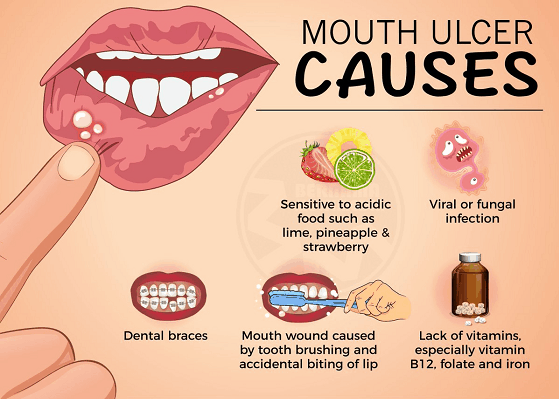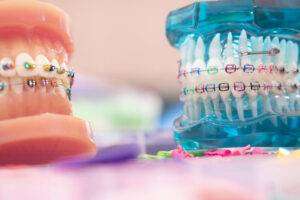Mouth ulcers can have causes and treatments that aren’t due to underlying disease. Examples include canker sores, burns, biting the tongue or cheeks, or eating acidic foods such as sour sweets and pineapple.
Most single mouth ulcers are caused by things you can try to avoid, such as: biting the inside of your cheek. badly fitting dentures, braces, rough fillings or a sharp tooth. cuts or burns while eating or drinking – for example, hard food or hot drinks.
Mouth ulcers – otherwise called canker sores – are regularly little, agonizing injuries that create in your mouth or at the foundation of your gums. They can make eating, drinking, and talking awkwardly.
Ladies, teenagers, and individuals with a family background of mouth ulcers are at higher danger of creating mouth ulcers.
Mouth ulcers aren’t infectious and typically disappear inside one to about fourteen days. Nonetheless, assuming you get a blister that is enormous or incredibly difficult, or on the other hand assuming that it goes on for quite a while without mending, you should look for the counsel of a specialist.
Ulcers are painful sores that appear inside the mouth. They are usually red or yellow. They are different from cold sores, which appear on the outer lips and are caused by a virus.
There are many things that cause mouth ulcers. The most common cause is injury (such as accidentally biting the inside of your cheek). Other causes include aphthous ulceration, certain medications, skin rashes in the mouth, viral, bacterial and fungal infections, chemicals and some medical conditions.
Aphthous ulcers
Aphthous ulcers are recurring ulcers which affect around 20 per cent of the population. Although in most people there is no known cause for aphthous ulcers, in a small number of people these ulcers may be due to an underlying vit. B, folate or Fe deficiency.
Symptoms of mouth ulcers
- painful sores on part of the skin lining the mouth.
- Swollen skin around the sores.
- Problems with chewing
- Irritation of the sores by salty, spicy or sour foods.
Types of mouth ulcers:
There are three types:
- Minor aphthous ulcersare the most common (8 in 10 cases). They are small, round, or oval and are less than 10 mm across. They look pale yellow but the area around them may look swollen and red. Only one ulcer may develop but up to five may appear at the same time. Each ulcer lasts 7-10 days and then goes without leaving a scar. They are not usually very painful.
- Major aphthous ulcersoccur in about 1 in 10 cases. They tend to be 10 mm or larger across. Usually only one or two appear at a time. Each ulcer lasts from two weeks to several months but will heal leaving a scar. They can be very painful and eating may become difficult.
- Herpetiform ulcersoccur in about 1 in 10 cases. These are tiny pinhead-sized ulcers, about 1-2 mm across. Multiple ulcers occur at the same time but some may join together and form irregular shapes. Each ulcer lasts one week to two months. Despite the name, they have nothing to do with herpes or the herpes virus.
General measures include
- Avoiding spicy foods, acidic fruit drinks and very salty foods (such as crisps) which can make the pain and stinging worse.
- Using a straw to drink, to avoid the liquids touching ulcers in the front of the mouth. (Note: do not drink hot drinks with a straw, as you may burn your throat.)
- Using a very soft toothbrush. See a dentist if you have badly fitting dentures.
- If you suspect a medication is causing the ulcers then a change may be possible. For example, if you are using oral nicotine replacement therapy (nicotine gum or lozenges), it may help to use a different type instead such as patches or nasal spray.
- Salt (saline) mouthwashes. Dissolve half a teaspoon of salt in a glassful of warm water, swish around your mouth and spit it out. This can be done as often as needed and may be soothing. Do not swallow the salt mouthwash.
Remember mouth ulcers need time to heal and there’s no quick fix.
Avoiding things that irritate your mouth ulcer should help:
- speed up the healing process
- reduce pain
- reduce the chance of it returning
which vitamin deficiency causes mouth ulcers
Whenever you don’t get sufficient vitamin B12, your body creates unusually huge red platelets that don’t work accurately. Lack of vitamin B12 is frequently connected with anemia, and it can cause indications that incorporate mouth ulcers.
See a dentist if your mouth ulcer:
- lasts longer than 3 weeks
- keeps coming back
- grows bigger than usual or is near the back of your throat
- bleeds or becomes more painful and red – this may be a sign of an infection
Although most mouth ulcers are harmless, a long-lasting mouth ulcer is sometimes a sign of mouth cancer. It’s best to get it checked.
We, at Amaya are here to help you out. Reach at on +919591895500 to book appointments. The first clinic in India to practice evidence-based Prosthodontics and practice.
We, at Amaya Dental, welcome you all with the strict hygiene protocol recommended by the Ministry of Health & Family Welfare (MoH&FW). Amaya is working towards making this journey easier for every Indian and helping them live healthier and longer lives. It’s the journey that takes you to new destinations every single day, with endless possibilities for life, back of energy, happiness, and hope.
We are also following the AMERICAN DENTAL ASSOCIATION’s new update to office procedures during covid 19 updated information as the strict protocol. Every practice is different and unique. Risk assessments are an integral part of ensuring the health, safety, and well-being of everyone within the workplace. We at Amaya Dental Clinic also believe in EVIDENCE-BASED PROSTHODONTICS AND PRACTICE.




